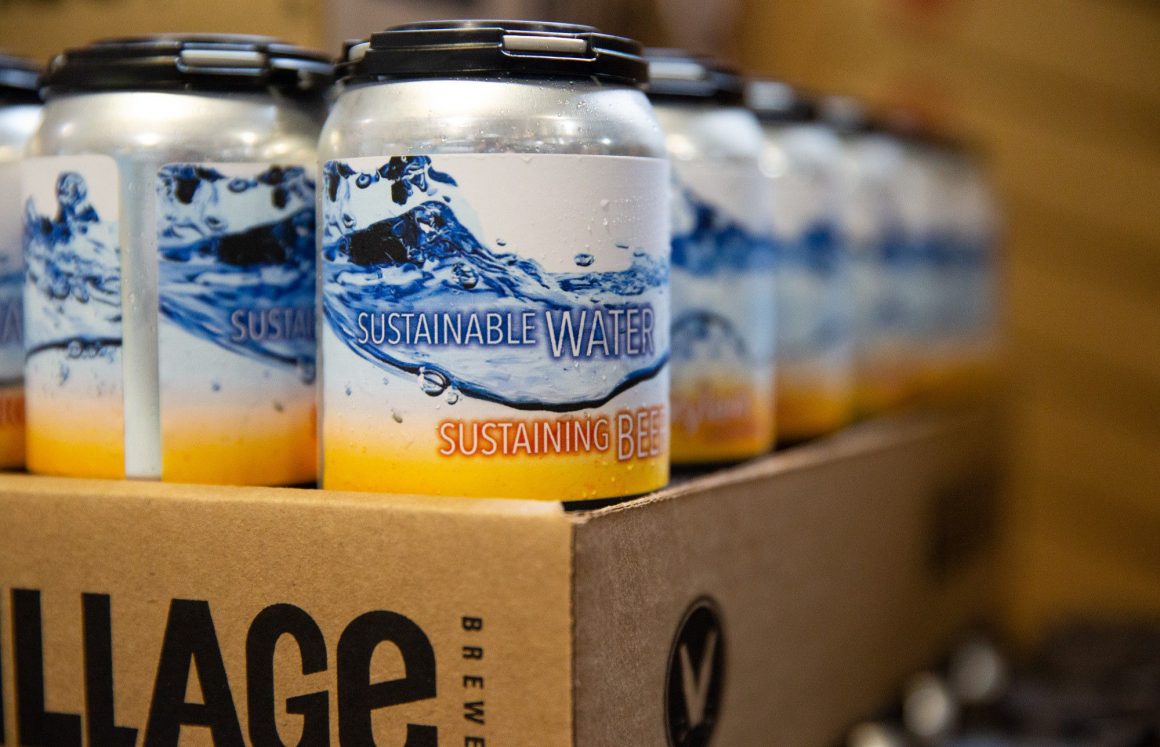
UCalgary and Village Brewery create Alberta’s first wastewater beer
By Nikayla Goddard, August 27 2020—
“It takes a village to raise a beer and a beer to raise a village” is Village Brewery’s slogan, which attests to their support to give back to their village through committing 10 per cent of their funds into arts, music and wellness in the community.
Their latest project is the result of a proposal from the University of Calgary’s Advancing Canadian Wastewater Assets (ACWA) in partnership with global water technology company Xylem, and involves the sustainable process of using wastewater to craft beer.
Christine O’Grady, ACWA’s program coordinator, sat down with the Gauntlet to discuss how the project began, what the wastewater treatment process looks like and the importance of considering sustainable options like reusing water. O’Grady’s background is in environmental science and microbiology, and her role is to coordinate the projects that come into the research and wastewater treatment plant facility, which is under an urban alliance between the University of Calgary and the City of Calgary.
The wastewater beer project started, O’Grady said, with a meeting with Xylem discussing collaboration ideas between them and ACWA in late 2019 / early 2020.
“We were looking at opportunities to collaborate, not at all inclusive of this beer project, and it just kinda came up as a bit of a lighthearted joke,” she described. “Then we got back from the meeting, and I thought, ‘Why don’t we make beer? We could do this.’ We literally had the technology right there.”
From there, her and a representative from Xylem made a phone call to Village Brewery, and after that made a PowerPoint pitch, focussing on the “bigger message of water reuse and sustainability […] and they were all over it.”
According to a released informative pamphlet, an “advanced physical-chemical-biological treatment system was used, and monitored for optimal performance. The water used to make this beer met the pathogen reduction requirements and the Canadian Water Drinking Guidelines. An accredited laboratory tested the water after treatment to ensure independent verification of its quality […] Municipal wastewater was treated in a full-scale Biological Nutrient Removal treatment plant, and then additional advanced treatment was done using ultrafiltration, followed by advanced oxidation (ozone + ultraviolet treatment), then reverse osmosis.” From there, the water was tested and shipped to Village Brewery, who conducted their regular methods of brewing using the treated water.
The goal was to have the project completed — water treated, beer made and packaged, marketed and ready to sell — by World Water Day, which was on Mar. 22. That goal was met, but then COVID-19 hit, World Water Day events were cancelled, and O’Grady said it was “no longer an appropriate time to message this […] so we decided to leave it for a bit. And about a month ago, we were feeling more confident in terms of the economy opening up and the safety surrounding people even just leaving their homes.”
She continued, “Our goal was to work together to demonstrate that potable water reuse is possible, and that technology and innovation makes it possible.”
A total of 1,600 cans, one batch, were produced using wastewater in the Village Blonde beer. While the cans were available for order online, they are now completely sold out.
When asked why ACWA and Xylem decided to approach Village out of all Alberta’s breweries, O’Grady said it boiled down to their connection to the community, their “sustainability-minded” approach and that members of Village were UCalgary alumni.
“It really was the result of a small business, a corporate organization, a municipality, an institution of higher learning and the provincial government in this instance,” she lauded.
The release was announced on Aug. 22, on Earth Overshoot Day, the day that marks when humanity has exhausted nature’s budget for the full year, after which humanity drains more than what the earth replenishes in terms of giving natural resources or taking pollutants. A webinar on Aug. 24 launched the product, and welcomed keynote speakers from North America, including Jackson Stuart, events and marketing lead for Village Brewery, Jacqueline Noga, University of Alberta Water and Resource Recovery Lab social research coordinator, Albert Cho vice president and general manager of Xylem, Robert Haller, executive director of the Canadian Water and Wastewater Association, United Nations University Institute for Water, Environment and Health chair in water and climate security Bob Sandford and more.
O’Grady described that while the project is complete and over, the impacts of this project are continuing on through the information it has provided to the government.
“For this project, what ended up happening, which was excellent, was [the government] ended up using this as a test case to further water reuse initiatives and create new policy in Alberta,” O’Grady said. “From the university’s perspective, I was really happy, because one of the Eyes High strategies is to work with the community […] and we were able to mobilize knowledge out of our institution and research facility in the university to enable the government to use that information to create more informed policy. And that was a giant win.”
